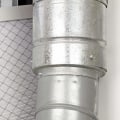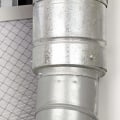As the COVID-19 pandemic continues to spread, many people are looking for ways to protect themselves and their families. One of the most common questions is whether a Minimum Efficiency Report Value (MERV) 8 filter is enough to protect against the virus. The answer is not as straightforward as it may seem.MERV ratings measure the ability of a filter to capture particulates. Filters with MERV-13 ratings or higher can trap smaller particles, including viruses.
Many home HVAC systems will have a MERV-8 filter installed by default. The Centers for Disease Control and Prevention (CDC) recommends a MERV of 13 or higher for trapping droplets and dust at least a few microns in diameter. A MERV 13 filter is a step in the right direction and captures more particulates than a typical MERV 8 filter. However, it is not as good at capturing small particles the size of a virus as a HEPA can.
A MERV 13 will trap less than 75% of air particles that are 0.3 to 1.0 microns in size (coronavirus is 0.1 micron). It is also difficult for many existing HVAC systems to adopt a MERV 13 due to the increased load on the fan by the finer filter media, which can actually cause more harm than good, as well as reduce airflow if your system is not designed to handle that type filter. On average, many installations are limited to one type of filter MERV 8 or MERV 9.Considering the threat posed by the spread of COVID-19 and other germs, upgrading a building's air filter to a HEPA is a much more effective step than simply a MERV 13 considering the small size of a virus (0.06-0.12 microns); the more efficient the filter, the better. MERV 17 to 20 will also capture virus carriers, carbon dust, combustion smoke, radon progeny and microscopic allergens (particles with a size of 0.3 microns).
Alternatively, you can upgrade the ventilation system itself, making it suitable for at least one type of filter with higher efficiency. When changing filters, it is advisable to assume that they contain microbiological active material and take precautions such as wearing gloves and respiratory protection if available, disposing of them in sealed bags and doing so outdoors if possible. In conclusion, while air filtration in buildings may be part of an overall risk mitigation approach, it is not generally considered a solution in itself. A MERV 8 filter may be sufficient for some applications but may not be enough for others. It is important to consider all factors when deciding which type of filter is best for your needs.






